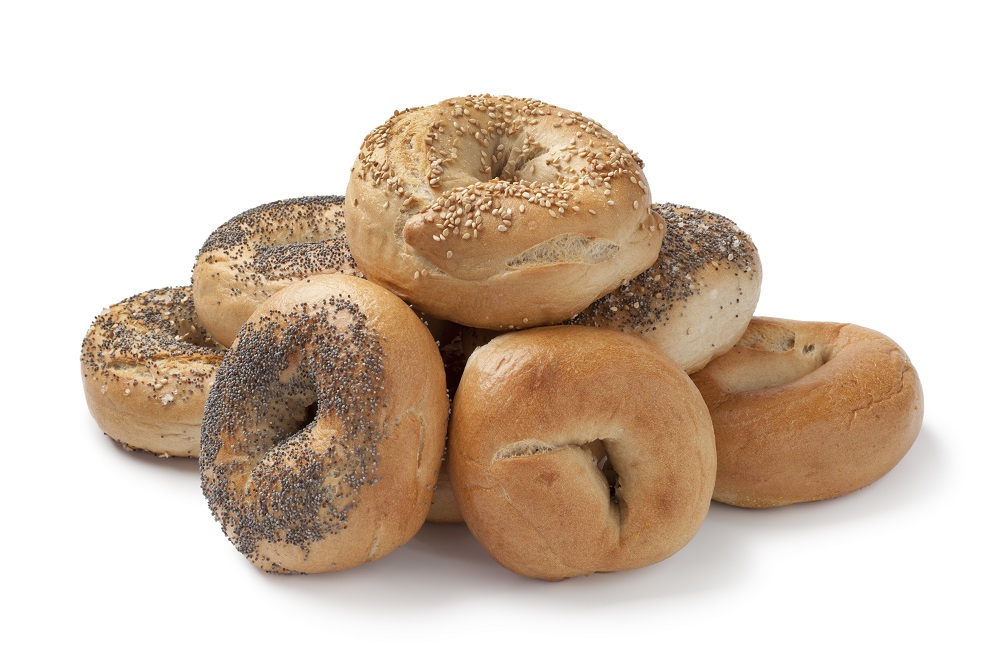Bagels are popular bread products that are especially associated with the Jewish community in New York. As a bread snack, bagels typically come in a wide variety of flavors and toppings.
Traditional bagels are vegan since they do not require the use of animal products or derivatives. However, bagels can quickly become non-vegan depending on the additional ingredients added for flavor. Common bagel ingredients that are non-vegan include dairy products (e.g., cream cheese, butter, cheese), eggs, and meat. However, vegans can enjoy traditional bagels with vegan ingredients such as sesame seeds, poppy seeds, fruits, herbs, and spices.

Bagels are ring-shaped bread products characterized by their dense and chewy interior contrasted with a browned and crispy exterior – qualities that are attributed to the way they are prepared.
Bagels are traditionally shaped like rings. While the historical decision to make them into rings is debatable, it is assumed that they are functionally designed that way to allow bakers to process batches of bagels simultaneously on a stick or rod.
The history of bagels is not fully understood but it is suggested that bagels are referenced in the Jewish communities of Krakow, Poland all the way back in 1610 (1). Following the eastward Jewish migrations in the Middle Ages, the bagel reached the USA with the mass Jewish migrations of the late nineteenth and early twentieth centuries.
People often mistake bagels and donuts due to their general ringed appearance, but the two food items have distinct differences. Firstly, the way the two are prepared is different. Donuts are typically fried while bagels undergo a characteristic two-step process of boiling and baking. The two are also presented differently as donuts are often presented as sweet desserts while bagels are more associated as bread products.
In making bagels, the first step is to prepare the dough. First, the yeast is added to water and left to rest to preemptively activate the yeast. After allowing the mixture to rest for around five minutes, the flour, sugar, and salt are added. The resulting dough is then kneaded and allowed to rise for an hour to an hour and a half. Once the dough has risen, it can be portioned and molded into the traditional ringed shapes. The bagels are then boiled for a couple of minutes before finally baking them to preference.
By themselves, bagels are vegan food products since they are simply made from vegan ingredients: flour, yeast, salt, water, and sugar.
However, bagels are considered as base bread products and it is common to find bagels added with other ingredients to diversify and widen their flavor profiles. The added ingredients would then be considered if whether the bagels are still vegan or not.
Some vegans might worry about the addition of sugar when making bagels. The concern stems from how some sugar manufacturers use bone char (charred animal bones) as a filtering mechanism. However, bagels can be made with any other sweetener that is completely vegan such as barley malt syrup, corn syrup, or malt extract.
Unfortunately, bagels can quickly become non-vegan depending on certain ingredients added to them for flavor. Here are some common examples of non-vegan ingredients that can be found on bagels:

Perhaps the most popular ingredient added to bagels would be cream cheese. To commemorate National Bagel Day (February 9), Grubhub conducted a survey regarding people’s favorite bagel toppings and flavors (2). The survey found that regular cream cheese was the number one favorite topping among its respondents.
Unfortunately, cream cheese is not vegan because it is made of milk and cream – both items that are derived from animals.
Eggs may not be among the most common toppings added to bagels, but many bakers prepare bagels with an egg wash prior to baking them. Eggs can also be seen as a common ingredient added when making bagel sandwiches (e.g., egg and cheese bagels, bacon, egg, and cheese bagels, egg salad bagels, etc.).
Eggs are not considered vegan because they are directly obtained from animal sources. Many vegans feel strongly against eggs since eggs represent the exploitation of the reproductive systems of chickens.
Cheese is another common ingredient that is typically added to bagels. In the same survey (2), American cheese was voted the fourth top bagel toppings in the US. As common as it is used in sandwiches and burgers, cheese is also a common ingredient added to bagel sandwiches.
Another dairy product, cheese is not considered vegan. Dairy products are avoided by vegans since they require milk for their production. Milk is especially problematic since the milk industry is associated with mistreatment of cows, forced impregnations, and the separation of the cow to its calf.
Following cheese in the survey (2), butter was voted as the fifth top bagel topping among the survey respondents. Butter is a traditional dairy product made from the fat and protein components of milk. Like cheese and cream cheese, butter is a common ingredient added to bagels and bagel sandwiches.
As a dairy product, butter is not vegan because it is derived from milk.
Different meats (e.g., pork, beef, fish, chicken) can be found in bagels and bagel sandwiches. Giving bagels additional protein and a savory flavor profile, it is not uncommon to find bagels with bacon added.
Unfortunately, any meat cannot be considered vegan since it is directly obtained from animal sources.
While many ingredients added to bagels are non-vegan, vegans can still enjoy many ingredients that can be added to bagels for added flavor while complying with their dietary restrictions.

While bagels can be prepared plain, it is common to prepare bagels covered with sesame seeds before baking. Sesame seeds are integral when making sesame bagels – the second top bagel flavor in the Grubhub survey (2). Sesame seeds are also the source of sesame oil.
Sesame seeds are completely vegan as they are simply the seeds of the sesame plant (Sesamum indicum).
Along with sesame seeds, poppy seeds are also traditional ingredients when preparing bagels. Not as common as sesame bagels but poppyseed bagels ranked as the fourth top bagel flavors among the respondents of the survey (2). Poppy seeds are tiny seeds that are used in many different cuisines. They are also the source of poppyseed oil.
Poppy seeds are vegan as they are simply the seeds of the opium poppy (Papaver somniferum).
Adding a wide variety of flavor, the flavor profiles of bagels can greatly benefit from the addition of spices such as cinnamon, garlic, and onion.
Spice is a general term for the flavor agents that come from various parts of a plant such as the seed, fruit, root, or bark. They are vegan as they do not contain any animal product or derivative.
It is very common to find bagels topped with a variety of fruits such as avocados, blueberries, raisins, and such. Not only do fruits enrich the flavor profiles of bagels, but they add aesthetic color to the bagels and provide nutrient supplementation.
Coming from plant sources, fruits are perfectly vegan options for adding to bagels.
References
